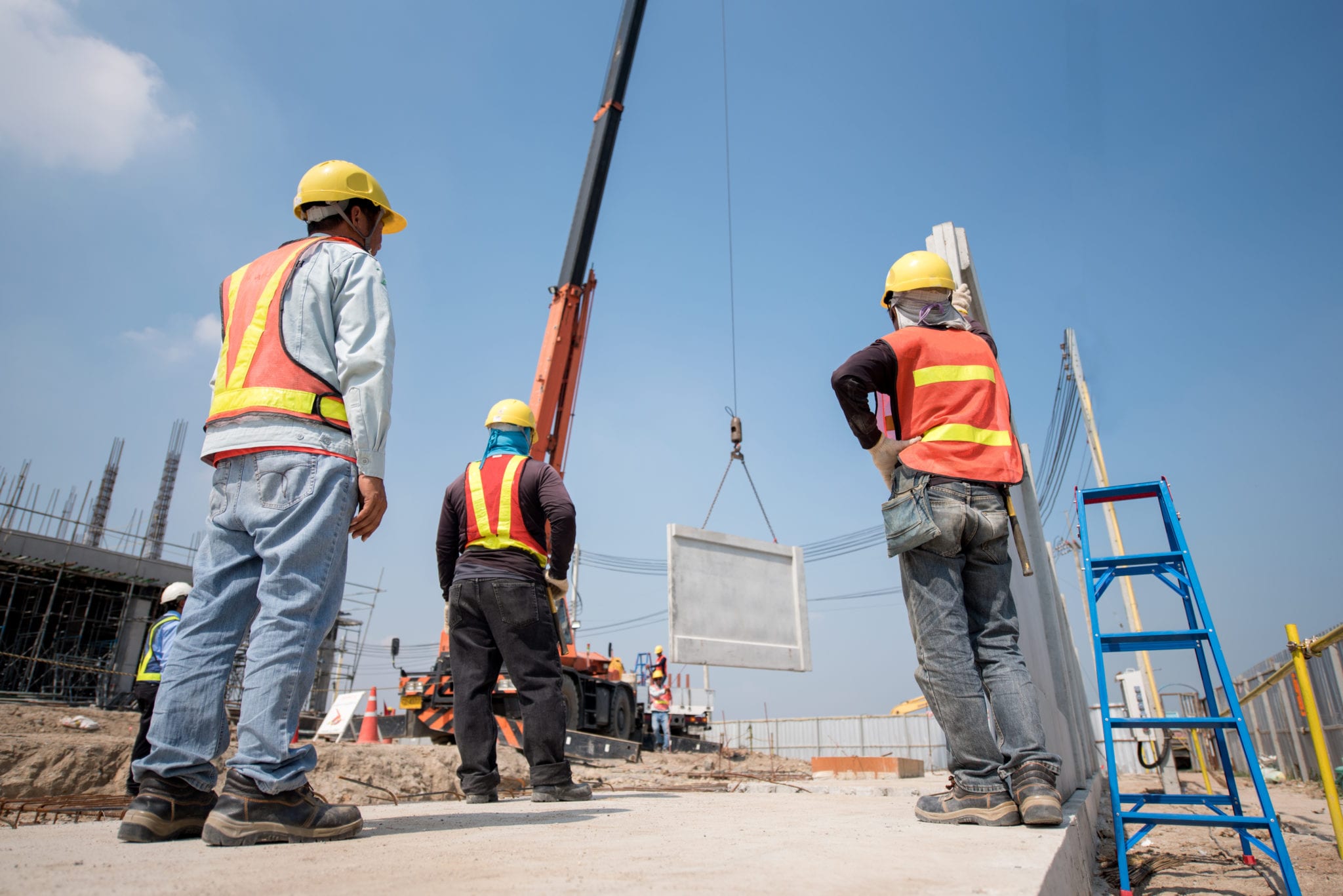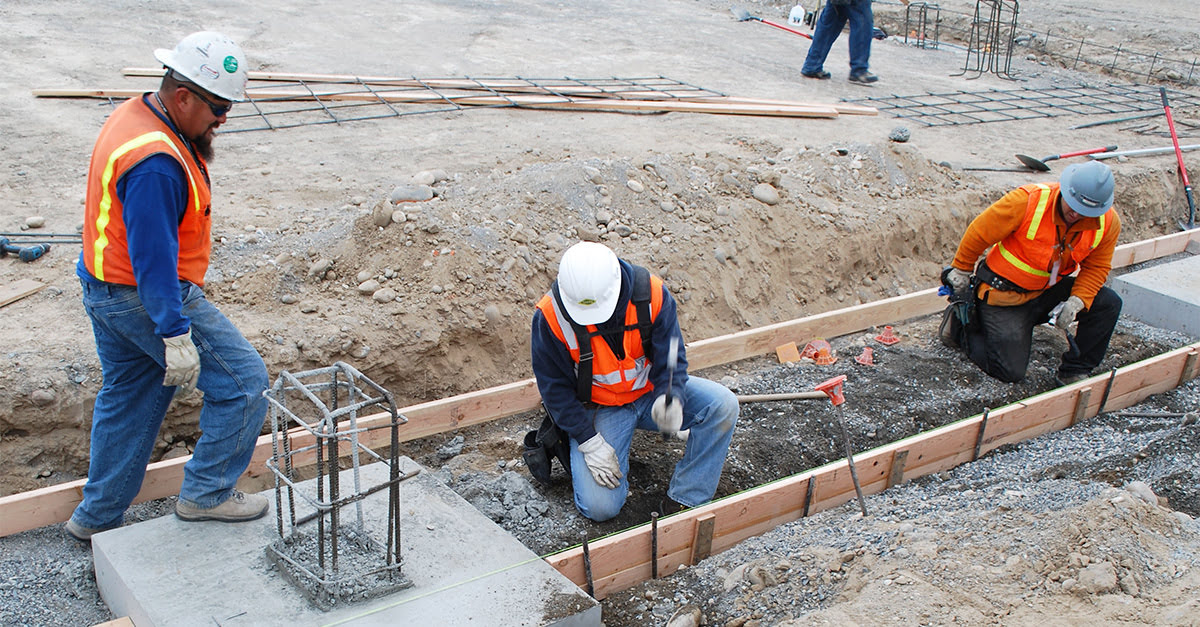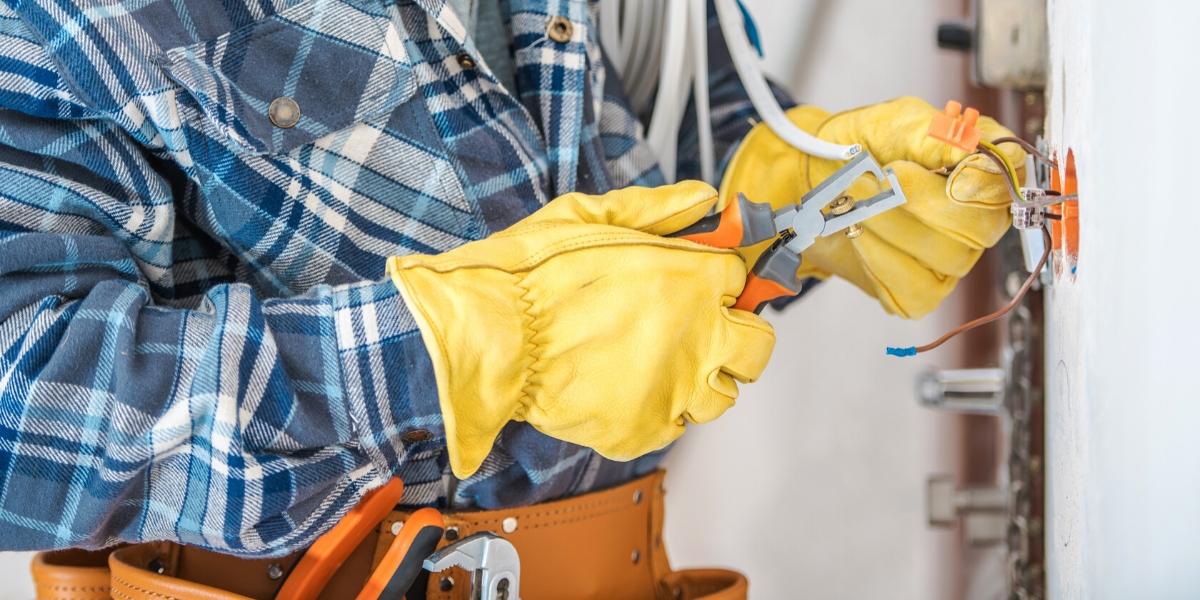Home>diy>Building & Construction>How Does A Bond Work In Construction


Building & Construction
How Does A Bond Work In Construction
Modified: January 9, 2024
Learn how a bond works in construction and the benefits it provides for building-construction projects. Understand the role of bonds in ensuring project completion and financial protection.
(Many of the links in this article redirect to a specific reviewed product. Your purchase of these products through affiliate links helps to generate commission for Storables.com, at no extra cost. Learn more)
Introduction
When it comes to construction projects, there are various factors that need to be considered to ensure the successful completion of the project. One crucial aspect that plays a significant role in the construction industry is the use of construction bonds. Construction bonds are an essential tool used to protect the interests of all parties involved in a construction project, including the project owner, contractors, and subcontractors.
Construction bonds provide financial security by guaranteeing that the contractor will perform the work as specified in the contract and pay subcontractors, suppliers, and laborers involved in the project. In simple terms, bonds act as a form of insurance, ensuring that the project is completed successfully and that all parties are compensated appropriately.
Understanding how construction bonds work is essential for anyone involved in the construction industry, as it can significantly impact project outcomes, financial stability, and the overall success of a construction venture. Whether you are a contractor, project owner, or subcontractor, having a solid comprehension of construction bonds is crucial for making informed decisions and avoiding potential risks and liabilities.
In this article, we will delve into the basics of construction bonds, exploring the different types of construction bonds, the role of surety companies, the process of obtaining a construction bond, and the benefits and risks associated with utilizing construction bonds.
By the end, you will have a comprehensive understanding of how construction bonds function and how they can benefit your construction projects. So, let’s dive in and unravel the intricacies of construction bonds in the construction industry.
Key Takeaways:
- Construction bonds provide financial security and assurance to all parties involved in construction projects, ensuring that contractors fulfill their obligations, project owners are protected, and subcontractors receive timely payment for their contributions.
- Surety companies play a crucial role in assessing risks, underwriting bonds, and handling claims, contributing to the success and integrity of construction projects while promoting fair practices and financial security.
Read more: What Are Construction Bonds
The Basics of Construction Bonds
Construction bonds are a type of contract between three parties: the project owner, the contractor, and a third-party entity known as a surety company. These bonds serve as a guarantee that the contractor will fulfill their contractual obligations, including completing the project on time, adhering to specifications, and paying subcontractors, suppliers, and laborers.
There are three primary types of construction bonds: bid bonds, performance bonds, and payment bonds. Let’s take a closer look at each of these bonds and their role in the construction process.
- Bid Bonds: Bid bonds are typically required during the bidding process for a construction project. They provide assurance to the project owner that the contractor who wins the bid will enter into a contract and perform the work at the price they have proposed. If the contractor fails to do so, the project owner can claim the bond amount to cover any additional costs incurred in hiring another contractor.
- Performance Bonds: Performance bonds are designed to protect the project owner and ensure that the contractor will complete the project as specified in the contract. If the contractor fails to fulfill their obligations, such as delays in completion or subpar workmanship, the bond amount can be used to hire another contractor to complete the project.
- Payment Bonds: Payment bonds are used to guarantee that the contractor will pay subcontractors, suppliers, and laborers involved in the project. They provide a financial safety net for these parties, ensuring that they will receive payment for their services and materials. If the contractor fails to pay, the surety company will step in to compensate the unpaid parties.
In addition to the three main types of construction bonds, there are also other specialized bonds that may be required depending on the nature of the project. These can include maintenance bonds, which provide coverage for any defects that may arise after the completion of the project, and supply bonds, which ensure the delivery of materials and equipment as specified in the contract.
Now that we have covered the basics of construction bonds and the various types available, it is important to understand the role of surety companies in the bonding process. Surety companies are responsible for underwriting and issuing the bonds, as well as assessing the risk associated with contractors and projects. They act as a financial intermediary between the project owner and the contractor, providing assurance and financial security.
In the next section, we will explore the process of obtaining a construction bond and the factors that are considered during the bonding process. Understanding these aspects will help you navigate the world of construction bonds more effectively and make informed decisions for your construction projects.
Types of Construction Bonds
In the construction industry, there are several types of bonds that are commonly used to mitigate risks and ensure the successful completion of projects. These bonds provide financial security to project owners, contractors, subcontractors, and suppliers. Let’s explore the different types of construction bonds in detail.
- Bid Bonds: Bid bonds are required from contractors during the bidding process for construction projects. They provide assurance to project owners that the contractor submitting the bid is capable of entering into a contract and performing the work if their bid is accepted. Bid bonds also protect project owners by ensuring that they can recover any additional costs incurred if the winning contractor fails to execute the contract.
- Performance Bonds: Performance bonds guarantee that the contractor will complete the project according to the terms and conditions specified in the contract. They protect the project owner from financial loss and provide assurance that the contractor will meet all contractual obligations, including project deadlines, quality standards, and specifications. If the contractor fails to fulfill their obligations, the project owner can make a claim on the performance bond.
- Payment Bonds: Payment bonds ensure that subcontractors, suppliers, and laborers involved in the project are paid for their work and materials. They protect these parties by providing a financial guarantee that they will receive compensation for their contributions. If the contractor fails to make timely payments, the surety company issuing the bond becomes responsible for compensating these parties accordingly.
- Maintenance Bonds: Maintenance bonds are sometimes required for certain construction projects. They provide coverage for a specified period after the project’s completion, typically one to two years, to guarantee that any defects, faults, or issues that arise within this period will be corrected at the expense of the contractor. Maintenance bonds offer peace of mind to project owners by ensuring that the contractor will address any problems that arise after the project’s completion.
- Supply Bonds: Supply bonds are commonly used in construction projects that involve the delivery of materials or equipment. They guarantee that suppliers will provide the required materials, products, or equipment on time and as specified in the contract. If the supplier fails to fulfill their obligations, the project owner can make a claim on the supply bond to cover any additional costs incurred in sourcing the materials or equipment from another supplier.
It’s important to note that the specific types of construction bonds required may vary depending on the project and jurisdiction. Some projects may require a combination of different bond types to ensure comprehensive protection for all parties involved.
Now that we have explored the various types of construction bonds, let’s delve deeper into the role of surety companies in the bonding process and how they assess the risks associated with contractors and projects.
Bid Bonds
Bid bonds play a crucial role in the bidding process for construction projects. When contractors submit bids for a project, the project owner typically requires them to provide a bid bond as a form of financial security. This bond serves as a guarantee that the winning contractor will enter into a contract if their bid is accepted and fulfill the project’s requirements.
The purpose of bid bonds is to protect project owners from potential financial loss and ensure that contractors are serious about their bids. By requiring bid bonds, project owners can filter out unreliable or unqualified contractors and select the most capable and committed contractor for the project.
Bid bonds are issued by surety companies, which act as intermediaries between the contractors and project owners. When a contractor submits a bid bond, the surety company undertakes the responsibility of paying the project owner a specified amount known as the penal sum if the contractor fails to fulfill their obligations under the contract.
If the project owner discovers that the winning contractor cannot or will not proceed with the contract, they can claim the bid bond amount to cover any additional costs incurred in re-advertising the project and selecting a new contractor. This provides financial protection to the project owner and ensures that they are not left in a vulnerable position if the winning contractor backs out of the project.
The amount of a bid bond is typically a percentage of the contractor’s bid. This percentage can vary, but it is usually around 5-10% of the total project cost. Depending on the project size and complexity, bid bond amounts can range from a few thousand dollars to millions of dollars.
To obtain a bid bond, a contractor must go through a process called underwriting. During underwriting, the surety company evaluates the contractor’s financial strength, experience, track record, and ability to perform the work. This assessment is crucial for determining the contractor’s risk profile and the bond’s premium, which is the cost paid by the contractor to obtain the bond.
It is important for contractors to understand that bid bonds differ from performance bonds. While bid bonds provide financial security during the bidding process, performance bonds come into play once the contract is awarded and the construction work begins. A successful bidder may need to provide a performance bond that guarantees the completion of the project according to the contract terms.
In summary, bid bonds are an integral part of the construction bidding process. They protect project owners by ensuring that contractors are committed to their bids and capable of entering into a contract. Bid bonds provide financial security and instill confidence in project owners, allowing them to select the best contractor for their projects.
Performance Bonds
Performance bonds are a vital component of construction projects, providing assurance to project owners that contractors will fulfill their contractual obligations. These bonds serve as a financial guarantee, ensuring that the project will be completed according to the specifications outlined in the contract.
When a contractor is awarded a construction project, they are typically required to provide a performance bond. This bond is issued by a surety company and acts as a promise that the contractor will complete the project as specified within the agreed-upon timeframe and to the expected quality standards.
By requiring performance bonds, project owners minimize the risk of financial loss and project delays caused by a contractor’s failure to meet their obligations. If the contractor fails to perform, the project owner can make a claim on the performance bond to recover the costs of rectification or hire a new contractor to complete the project.
The amount of a performance bond is usually a percentage of the contract value and can range from 10% to 100% depending on the project’s complexity, size, and level of risk. This bond’s value reflects the potential financial impact on the project owner if the contractor does not complete the work as promised.
To obtain a performance bond, contractors must undergo an underwriting process with the surety company. The underwriter assesses the contractor’s financial stability, track record, experience, and ability to complete the project successfully. This evaluation helps the surety company determine the contractor’s risk level and the premium required for the performance bond.
Once a performance bond is in place, it serves as a form of protection for the project owner throughout the construction process. If the contractor fails to meet the contract’s terms and conditions, the project owner can file a claim against the performance bond. The surety company will then investigate the claim and, if valid, fulfill its obligations by providing the necessary funds to rectify the situation.
In some cases, performance bonds may also cover consequential damages incurred by the project owner due to the contractor’s poor performance. This can include compensation for delays, additional construction costs, or other financial losses resulting from the contractor’s failure to meet obligations outlined in the contract.
It’s important to note that performance bonds not only protect project owners, but they also benefit contractors. By providing a performance bond, contractors demonstrate their credibility and commitment to completing the project successfully. This gives project owners confidence in the contractor’s capabilities and can help contractors secure more construction projects in the future.
In summary, performance bonds provide financial protection to project owners and ensure that contractors fulfill their contractual obligations. These bonds foster trust between project owners and contractors, contributing to the successful completion of construction projects while mitigating risks for all parties involved.
Read more: What Is Bid Bond In Construction
Payment Bonds
Payment bonds are a crucial aspect of construction projects, providing financial protection to subcontractors, suppliers, and laborers involved in the project. These bonds ensure that these parties will receive timely payment for their services and materials, even if the contractor fails to fulfill their payment obligations.
When a project owner requires a payment bond, the contractor is responsible for obtaining it from a surety company. The payment bond serves as a guarantee that subcontractors, suppliers, and laborers will be paid for their work and materials, regardless of any issues that may arise between the contractor and these parties.
The primary purpose of payment bonds is to protect subcontractors, suppliers, and laborers from potential financial loss. Without these bonds, these parties could face difficulties in receiving payment, which can lead to disruptions in the construction project or even legal disputes.
If the contractor fails to make the necessary payments, the surety company issuing the payment bond steps in to fulfill the financial obligations. This ensures that subcontractors, suppliers, and laborers are compensated for their contributions to the project. The surety company may then recover the funds from the contractor through legal means.
The amount of a payment bond is typically a percentage of the contract value. The specific percentage can vary depending on several factors, including the project’s size, complexity, and the anticipated costs of subcontractors and materials.
To obtain a payment bond, contractors must go through an underwriting process with the surety company. This assessment helps ensure that the contractor has the financial ability to pay subcontractors and suppliers and operates in good faith. The surety company will closely examine the contractor’s financial history and track record to determine the level of risk involved in issuing the payment bond.
In the event of a payment dispute, the affected subcontractor, supplier, or laborer can make a claim against the payment bond. They must provide evidence of their contribution to the project and demonstrate that the contractor failed to make the necessary payments. The surety company will then investigate the claim and, if valid, compensate the unpaid party accordingly.
Payment bonds are especially beneficial for subcontractors and suppliers who may not have direct contracts with the project owner. These bonds offer them financial security and minimize the risk of non-payment, allowing them to focus on their work without worrying about potential payment issues.
In summary, payment bonds play a critical role in the construction industry by protecting subcontractors, suppliers, and laborers from non-payment. These bonds ensure that these parties will be compensated for their contributions to the project, fostering a fair and transparent payment process. Payment bonds promote trust and cooperation among all parties involved, contributing to the successful completion of construction projects.
When a contractor obtains a construction bond, it guarantees that they will complete the project as per the contract. If they fail to do so, the bond will cover the costs of completing the project.
Role of Surety Companies
Surety companies play a vital role in the construction industry, particularly in the realm of construction bonds. As intermediaries between contractors and project owners, surety companies provide financial security and assurance to all parties involved in a construction project. Let’s dive into the key roles and responsibilities that surety companies fulfill.
1. Underwriting: Surety companies are responsible for underwriting construction bonds. During the underwriting process, the surety company evaluates and assesses the contractor’s financial stability, track record, experience, and ability to fulfill their contractual obligations. This thorough evaluation helps determine the contractor’s risk level and the premium required for the bond.
2. Issuing Bonds: Once the underwriting process is complete, the surety company issues the appropriate construction bonds, such as bid bonds, performance bonds, and payment bonds. These bonds provide financial assurance to project owners, ensuring that the contractor will fulfill their obligations and that subcontractors, suppliers, and laborers will be paid accordingly.
3. Risk Assessment: Surety companies are experts in risk assessment. They carefully evaluate the contractors and construction projects to determine the level of risk involved. By assessing the financial strength, experience, and track record of the contractors, surety companies can accurately gauge the likelihood of successful project completion and mitigate potential risks.
4. Claims Handling: In the event that a contractor fails to meet their contractual obligations, project owners or other affected parties may file a claim against the bond. Surety companies handle these claims by thoroughly investigating the circumstances and ensuring that the appropriate steps are taken to mitigate the impacts. If the claim is validated, the surety company provides the necessary financial compensation to the affected party.
5. Financial Security and Protection: Surety companies offer financial security and protection to project owners and other parties involved in construction projects. By providing bonds, these companies guarantee that contractors and subcontractors will fulfill their obligations, ensuring that the project is completed as planned and that subcontractors and suppliers are compensated appropriately.
6. Mediation and Dispute Resolution: Surety companies often play a mediating role in disputes that may arise during the construction project. As a neutral party, they can facilitate communication between the contractor and the project owner, seeking to resolve issues before they escalate. This can help maintain a collaborative environment and prevent potential delays or disruptions.
In summary, surety companies are essential players in the construction industry. They provide financial security, risk assessment, and claims handling services. By working with surety companies, project owners, contractors, subcontractors, and suppliers can ensure a smooth construction process, minimize risks, and enhance the overall success of construction projects.
The Process of Obtaining a Construction Bond
Obtaining a construction bond is a crucial step for contractors and subcontractors involved in construction projects. The process involves several steps to ensure that the contractor meets the necessary requirements and can provide the financial security needed for the project. Let’s explore the typical process of obtaining a construction bond.
1. Prequalification: Before beginning the process of obtaining a construction bond, contractors may need to undergo a prequalification assessment. Prequalification involves evaluating the contractor’s financial stability, experience, track record, and capacity to complete the project successfully. This step helps determine if the contractor meets the necessary criteria set by the surety company.
2. Selecting a Surety Company: Contractors will need to choose a reputable surety company to issue the construction bond. It’s essential to consider factors such as the surety company’s financial strength, industry reputation, and experience in the construction sector. Contractors may seek recommendations or conduct research to identify a reliable surety company.
3. Completing an Application: Once a surety company is selected, contractors must complete an application for the construction bond. The application typically requires detailed information about the contractor’s financial statements, project history, references, and other relevant details. Contractors may need to submit corporate or personal financial statements, along with any supporting documentation requested by the surety company.
4. Underwriting Process: After submitting the application, the surety company evaluates the contractor’s financial position, creditworthiness, track record, and ability to perform the project. This process involves a thorough assessment of the contractor’s financial statements, credit history, project management capabilities, and previous project performance. The surety company may request additional documentation or clarification during this stage.
5. Bond Issuance: If the underwriting process is successful and the contractor meets the surety company’s criteria, the construction bond will be issued. The bond will specify the type of bond (e.g., bid bond, performance bond, payment bond), the penal sum (the maximum amount the surety company will pay), and the project details. The contractor is responsible for paying the premium associated with the bond, which is usually a percentage of the bond amount.
6. Bond Renewal: Construction bonds typically have a specific duration that aligns with the project timeline. If the project extends beyond the bond’s duration, the contractor may need to renew the bond or obtain an extension to ensure continuous coverage and comply with contractual obligations.
It’s worth noting that the process of obtaining a construction bond may vary slightly depending on the surety company and specific project requirements. However, the general steps outlined above provide a framework for contractors to understand the underlying process and requirements involved in obtaining a construction bond.
By successfully obtaining a construction bond, contractors can instill confidence in project owners, demonstrate their financial stability and ability to fulfill obligations, and secure reliable financial protection for their projects. Working closely with a reputable surety company throughout the process can help contractors navigate the complexities of obtaining a construction bond and ensure project success.
Factors Considered in Bonding Construction Projects
When bonding construction projects, surety companies carefully evaluate several factors to assess the risk involved and determine whether to issue a bond. These factors help determine the contractor’s ability to fulfill their contractual obligations and provide the necessary financial security for the project. Let’s explore some of the key factors that surety companies consider when bonding construction projects.
1. Financial Stability: Surety companies assess the financial stability of the contractor, including their cash flow, liquidity, debt-to-equity ratio, and overall financial health. This evaluation helps determine the contractor’s ability to manage project finances, pay subcontractors and suppliers promptly, and fulfill their financial commitments.
2. Experience and Track Record: Surety companies look at the contractor’s experience and track record in executing similar projects. They assess the contractor’s expertise, project management capabilities, and successful completion of past projects. Contractors with a proven history of completing projects on time, within budget, and with high quality are viewed more favorably by surety companies.
3. Workload and Capacity: Surety companies consider the contractor’s current workload and capacity to handle additional projects. They analyze whether the contractor has enough resources, including personnel, equipment, and subcontractors, to successfully complete the bonded project without compromising the quality or timeline.
4. Management and Personnel: The qualifications and experience of the contractor’s management team, key personnel, and project staff are important factors. Surety companies assess the contractor’s organizational structure, project management systems, and the expertise and stability of the team members involved in the project’s execution.
5. Bonding History: Surety companies also review the contractor’s bonding history. They examine past performance on bonded projects, including any claims made against previous bonds or instances of default. A positive bonding history enhances the contractor’s reputation and increases their chances of obtaining bonding for future projects.
6. Reputation and References: Contractors with a good reputation in the industry tend to have an advantage in obtaining construction bonds. Surety companies may seek references from project owners, subcontractors, suppliers, and other industry professionals to assess the contractor’s reputation, integrity, and ability to maintain positive working relationships.
7. Legal and Regulatory Compliance: Contractors must comply with legal and regulatory requirements. Surety companies verify the contractor’s adherence to licensing, insurance, safety, labor, environmental, and other statutory obligations. Compliance with these requirements demonstrates the contractor’s commitment to operating ethically and responsibly.
By thoroughly considering these factors, surety companies can assess the overall risk associated with bonding construction projects. Contractors who demonstrate strong financials, a solid track record, and the necessary resources and expertise are more likely to secure bonding for their projects. This process ensures that project owners receive reliable financial protection and contractors can gain the confidence and trust of project owners, subcontractors, and suppliers.
Read more: How Does Retention Work In Construction
Benefits and Risks of Construction Bonds
Construction bonds serve as valuable tools in the construction industry, providing numerous benefits to project owners, contractors, subcontractors, and suppliers. However, like any financial instrument, there are also inherent risks involved. Let’s explore the benefits and risks of construction bonds.
Benefits of Construction Bonds:
- Financial Protection: Construction bonds provide financial protection to project owners by ensuring that contractors fulfill their contractual obligations. If the contractor fails to meet the terms of the contract, the project owner can make a claim on the bond to cover any additional costs incurred.
- Quality Assurance: Performance bonds, in particular, ensure that the project will be completed to the specified quality standards outlined in the contract. Project owners can expect the deliverables to meet or exceed their expectations, as the bond provides the necessary motivation for the contractor to deliver high-quality work.
- Subcontractor and Supplier Payment: Payment bonds guarantee that subcontractors, suppliers, and laborers involved in the project will be paid for their work and materials. This fosters a fair payment process, reduces the risk of non-payment, and promotes healthy working relationships among all parties.
- Enhanced Contractor Credibility: By obtaining construction bonds, contractors demonstrate their financial stability, experience, and ability to fulfill their contractual obligations. This enhances their credibility in the industry and increases their chances of winning bids for future projects.
- Prequalification and Risk Mitigation: The underwriting process for obtaining a construction bond includes a thorough evaluation of the contractor’s financials, experience, and track record. This prequalification process helps mitigate risks by ensuring that only qualified and capable contractors are approved for bonding.
Risks of Construction Bonds:
- Denial of Bond: There is a possibility that a contractor may be unable to obtain a construction bond due to factors such as poor financials, lack of experience, or a negative bonding history. This can limit the opportunities available to the contractor and potentially impact their ability to secure certain projects.
- Premium Costs: Contractors need to pay a premium to obtain construction bonds. The premium is typically a percentage of the bond amount and is based on factors such as the contractor’s financial stability and risk profile. The cost of the premium can vary and should be factored into the project’s overall budget.
- Risk of Bond Claims: If a contractor fails to meet their contractual obligations, project owners or other affected parties may make a claim on the bond. While surety companies handle these claims, contractors should still strive to avoid situations that could lead to bond claims, as this can impact their reputation and future bonding opportunities.
- Contractual Compliance: Construction bonds typically require adherence to specific terms and conditions outlined in the contract. Contractors must ensure compliance with these requirements to avoid potential bond claims or other legal consequences.
In summary, construction bonds offer significant benefits in terms of financial protection, quality assurance, and subcontractor payment. They enhance contractor credibility, facilitate prequalification, and promote fair and successful construction projects. However, there are risks involved, such as the potential denial of bonding, premium costs, and the need for strict contractual compliance. Understanding these benefits and risks is important for all parties involved in the construction process to make informed decisions and manage potential challenges effectively.
Conclusion
Construction bonds are a vital aspect of the construction industry, providing financial security and assurance to project owners, contractors, subcontractors, and suppliers. These bonds serve as guarantees that contractors will fulfill their contractual obligations, complete projects on time, and pay subcontractors and suppliers promptly.
Throughout this article, we have explored the basics of construction bonds, including bid bonds, performance bonds, and payment bonds. We discussed the roles and responsibilities of surety companies in the bonding process, as well as the factors they consider when evaluating contractors and projects. We also weighed the benefits of construction bonds, such as financial protection, quality assurance, and enhanced credibility, against the potential risks involved, such as bonding denials and premium costs.
By understanding the intricacies of construction bonds, contractors can navigate the bonding process more effectively, secure reliable financial protection for their projects, and build trust with project owners and other stakeholders. Project owners can have confidence that contractors are financially stable and capable of fulfilling their obligations, while subcontractors and suppliers can be assured of timely payment for their contributions.
It is crucial for all parties involved in the construction industry to recognize the value and importance of construction bonds. Contractors should strive to maintain strong financials, establish a solid track record, and operate with integrity to enhance their chances of obtaining bonds. Project owners should carefully evaluate contractors and select those who demonstrate a commitment to quality, timely completion, and robust financial management.
Surety companies play a critical role in assessing risks, underwriting bonds, and handling claims. By partnering with reputable surety companies and understanding the bonding process, contractors can navigate the complexities of obtaining construction bonds and ensure project success.
In conclusion, construction bonds provide financial security, promote fair practices, and foster successful construction projects. With a solid understanding of construction bonds and the support of reputable surety companies, the construction industry can thrive, ensuring the timely and successful completion of projects while mitigating risks and protecting the interests of all parties involved.
Frequently Asked Questions about How Does A Bond Work In Construction
Was this page helpful?
At Storables.com, we guarantee accurate and reliable information. Our content, validated by Expert Board Contributors, is crafted following stringent Editorial Policies. We're committed to providing you with well-researched, expert-backed insights for all your informational needs.














0 thoughts on “How Does A Bond Work In Construction”